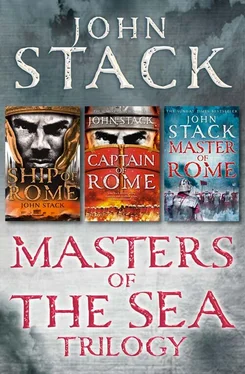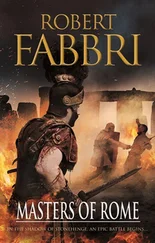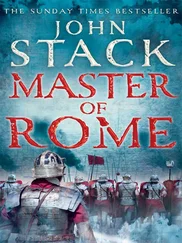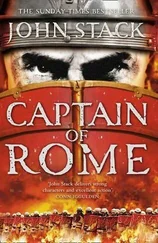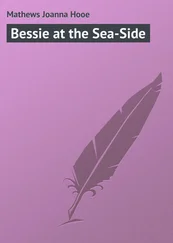‘There, sire,’ the man pointed, his hand shaking, ‘low on the horizon. That’s the headland. Cape Orlando. Brolium is a league west.’
‘You’re sure?’ Gisco asked, his voice threatening the same fate the pirate had seen his crewmates suffer.
‘Yes, sire, I swear it,’ he whimpered, ‘we were in these waters for four weeks. We saw the Roman transport barges ply in and out of Brolium many times, although they were too big a prey for us to take. The latest fleet of over two dozen arrived only three days ago.’
Gisco grunted a reply as he stared through the pre-dawn light to the dark mass of the headland on the horizon.
‘Remove this man from my sight,’ he ordered, ‘throw him over the side.’
The pirate screamed for mercy as the guards lifted him off the deck. In two quick strides they were at the rail and they threw the pirate overboard, his cries cut short as he hit the water ten feet below. Within seconds he was lost beneath the waves.
Gisco smiled. The gods were looking favourably on him this day. The day before, one of the galleys in the rearguard of the fleet had captured a pirate bireme as they moved north through the strait. Many of the crew were instantly put to the sword, the Carthaginians sharing the hatred of pirates that all men of the sea held, but the senior crew had been brought to the flagship where they were tortured for information on Roman naval activity in the area. Gisco’s original plan called for an extensive search to find the Romans’ supply hub once the fleet had reached Panormus, but fortune had smiled on him and the pirates had now given him the information he needed to carry the battle to the Romans.
‘Captain Mago,’ Gisco ordered, ‘signal to the fleet: the first four squads are to remain on station here with the Melqart . The remaining six are to continue to Panormus with all possible speed. Have the squad commanders report to the flagship.’
‘Yes, Admiral,’ Mago replied, and took off towards the stern to signal Gisco’s orders to the ships behind them. Within minutes the four squads of five galleys had broken off from the fleet, each squad comprising a quinquereme leading a group of four triremes. The Melqart also broke formation.
Fifteen minutes later the four squad commanders boarded the Melqart . Gisco met them on the foredeck.
‘The Romans are using the port of Brolium as their supply hub. It is there …’ Gisco pointed towards the distant coast ‘… two points west of that headland. We will move two leagues north of here and cast our net across their course to the mainland. Deploy with bows forward to the mainland. No sails. I want the profile of your ships to be as small as possible. At that distance out, when we are spotted, the transport barges will be too far from port to run. I want your quinqueremes on the extreme flanks. I will take the centre. Get behind them quickly and push them towards me. We will crush them between us.’
‘Yes, Admiral.’ The four captains saluted and turned to leave the foredeck.
‘One more thing, Captains,’ Gisco added, arresting their departure. ‘We take no prisoners. Every barge is to be sunk. No exceptions. Understood?’
‘Yes, Admiral,’ they repeated and left.
‘Now,’ Gisco thought as he looked up at the rapidly brightening sky, ‘let them come.’
Drusus Aquillius Melus, captain of the transport barge Onus , was nervous. Word had swept through the port of Brolium that the trireme that had rushed into the harbour the day before had encountered a Carthaginian fleet of galleys. The rumours had been contradictory, with some claiming the fleet was travelling east and others that it was going west, while estimates of its number varied from three to over a hundred. One thing was clear though, and on this all were agreed, their days of shipping supplies from the mainland to Brolium were numbered. Melus hoped that the days of his life were not similarly marked.
The captain looked up at the mainsail and checked its line as his barge moved slowly out of the harbour. His ship was two hundred feet long and thirty feet wide, a behemoth of the sea, as long as a quinquereme, but wider in the beam and over twice as tall from the waterline. The offshore breeze was light and he estimated their best speed once clear of the port would be no more than five knots. At this speed the passage to Naples would take nearly two full days. He looked over his shoulder at the thirty-two other barges making their way ponderously under sail. They would separate out as the day wore on, the new ships outpacing the older, the experienced crews faster than the inexperienced. Each ship had its own pace. Unique. By nightfall they would aim to have a half-mile between each ship, to avoid collisions in the dark. Now, grouped together, the flotilla of transports seemed to Melus to resemble a flock of sheep, the bellies of their broad white mainsails stretching out across the width of the harbour. A sight to see. He looked up above them to the sky overhead. It was a clear day which promised clear sailing. Perfect weather for navigation. Two days, he repeated to himself, two days and home.
The Aquila cast off from the dockside as the last of the transport barges weighed anchor and raised sail. The larger vessels moved slowly under sail and Gaius wove the Aquila nimbly through their ranks using the galley’s superior manoeuvrability under oars. Scipio stood alone on the aft-deck, watching the action of the crew around him intently, his journey on the Aquila marking his first time on a galley. The consul was travelling light in comparison to his arrival three days before on one of the transport barges. The confined and valuable space aboard a fighting vessel meant that his entourage consisted of merely his guard commander and four praetoriani with his Nubian slave, Khalil, in attendance. In any other place the reduced guard would be foolhardy, but in the isolation of a galley at sea it seemed almost excessive. The only enemies that threatened him were the Carthaginians and, if the Aquila was somehow attacked in strength, the fact that his guard was four instead of twenty-four would make little difference.
Atticus watched the consul surreptitiously as the Aquila gained the lead on the fleet of barges. Lucius ordered the sail raised, transferring the exertion of the rowers to the wind. The galley’s combination of oars and sail would maintain a slight gap on the barges, keeping her in the van of the flotilla. Septimus joined Atticus on the foredeck.
‘Rome!’ he smiled, and slapped Atticus’s shoulder.
Atticus couldn’t help but smile, his friend’s good mood at returning to his home city infectious.
As a younger man, with the wanderlust of youth powerful in his veins, Atticus had wanted to travel to Rome and all the great cities of the Republic, and from there beyond to the distant shores of the Mediterranean, the great sea that touched all the coastlines of the known world. That ambition had narrowed with age, tempered by realities and his duty to his ship and crew. But the desire to see Rome had always stayed with him, a desire to see the centre of the Republic, to grasp the atmosphere in the city that inspired men to conquer the world around them.
Captain Melus stared at the galley moving effortlessly through the water. The wind had picked up after leaving port and so now, two hours out from Brolium, the galley was still within a mile of the leading ships on the port side of the fleet. Melus had served twenty years on a trading galley, rising to the rank of boatswain. His share of the profit over those years had provided him with the opportunity to purchase a part share in the Onus which, thanks to the campaign on Sicily and the almost constant supply drops, was proving to be a profitable investment. That would all change with the commencement of a blockade and Melus cursed Fortuna for her fickle nature.
Читать дальше
